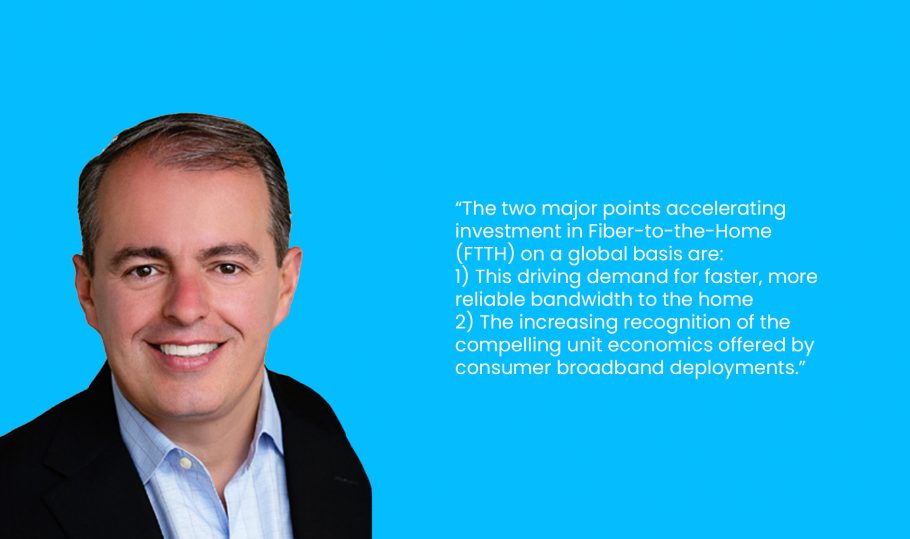It’s Internet stuff!” A colleague’s neighbor proclaimed this in early March at the sight of a construction crew hanging fiber down a street in Connecticut. On the heels of Oak Hill Capital Partners’ January 2021 investment, it was the GoNetspeed crew at the beginning of a monthslong project, which represents the first significant fiber infrastructure deployment in Connecticut in more than a decade.
The COVID-19 pandemic sent millions home to compete with Netflix and Xbox for bandwidth. With a 40+ percent growth in the downstream usage of the average home, never has there been such a focus on “Internet Stuff.” The two major points accelerating investment in Fiber-to-the-Home (FTTH) on a global basis are:
1) This driving demand for faster, more reliable bandwidth to the home 2) The increasing recognition of the compelling unit economics offered by consumer broadband deployments.
NORTH AMERICA – SURGING PRIVATE INVESTMENT ACROSS MULTIPLE CATEGORIES
The surge in consumer broadband investment perhaps is illustrated best by North America’s recent investment activity. Currently, in the last twelve months, more than 38 consumer-broadband focused transactions have been completed, which represent more than $15 billion in announced transaction volume. Of those 38 M&A transactions, 21 qualify as platform investments—private equity or infrastructure fund complexes establishing new investments to address this evolving market.
In many ways, it is fitting to lead off this article referencing an Oak Hill investment. The firm supplemented its leadership position in the category having already backed MetroNet alongside the Cinelli family in 2014 (the largest pure-play FTTH operator in the US) by establishing new platforms on the West Coast (Race Communications) and in the Northeast (GoNetspeed and OTTC). Oak Hill has not been alone in ramping up investment in the sector in the last year. Crosstimbers Capital made an investment in Gateway Fiber to build-out fiber in St. Louis and surrounding markets. This was Crosstimbers Capital’s second FTTH investment following its partnership with Carter Old and Hal Brumfield with Houston-based Tachus. M/C Partners backed Brady Adams to establish AerioConnect on the West Coast. SDC Partners bought a stake in Allo Communications for $197 million. Newlight Partners backed Sail Internet. And, Peppertree led a financing round for Snip Internet in Ohio. Sector platform companies did continue both organic and inorganic expansion. This is illustrated by Mark Murphy’s Greenlight Networks, backed by Tom Golisano’s family office, acquiring Plexicomm to expand into adjacent markets, and ITC Capital Partners and Stephens Capital Partners-backed Point Broadband making multiple acquisitions to expand its footprint.

Not to be outdone, likewise, the infrastructure funds ramped up investment in the sector in 2020 and into 2021. Notable transactions include: Carlyle Infrastructure’s backing of Wyyerd Group, DIF Capital Partners acquisition of Valley Fiber, Nova Infrastructure’s investment in telMAX alongside Quintana, Wren House Infrastructure’s acquisition of i3 Broadband, Stonepeak’s acquisition of RCN/Grande/Wave from TPG and GI Partners’ acquisition of Vast Broadband’s operations in the Pacific Northwest, which followed an earlier investment in Blue Stream Fiber.
Even the cable MSOs got in on the action. To add North Carolina to its footprint, Altice USA acquired Morris Broadband. Following up on its $575 million deal with GTCR and Mega Broadband in the fall, Cable One absorbed Hargray Communications for $2.2 billion, having become a minority investor just months before.
ABOUT THE AUTHOR
Richard Lukaj has nearly 30 years of investment banking experience, having originated, structured and executed hundreds of deals that total over $100 billion of transaction value. Lukaj is a founder and managing partner of Bank Street. He aspires, alongside his colleagues, to create a premier investment banking franchise focused on growth sectors of the global economy. Lukaj has conducted a variety of deals throughout the course of his successful investment banking career, covering mergers and acquisitions, underwriting of debt, equity and derivative securities, restructurings, exclusive sales and other financial advisory mandates. Although heavily focused toward the Media, Communications and Technology industries, he also has a very broad industry experience in the Industrial, Consumer, Retailing, Energy, Aerospace, Specialty Finance, Real Estate and Natural Resources arenas.

